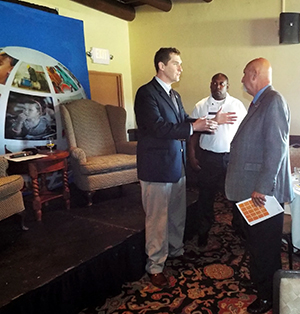
It’s Veterans Day. What does that have to do with development and diplomacy?
November 11 first became a Federal Holiday after World War I. If you know your history, you know that the 11th hour of the 11th day of the 11th month was when the guns fell silent on the battlefields of Europe and the fighting in the Great War ceased. The Senators and Congressmen who created Armistice Day wanted it to be a promise to the soldiers, sailors, and Marines coming home that they would never be sent to war again. Less than 25 years later, war happened again, but this time, after the war Congress invested in building a lasting peace by supporting the Marshall Plan.
The lesson here is that it takes more than platitudes. On Veterans Day, you can’t just say “I support the troops” or “I support ending war.” On Veterans Day, honoring the service of our veterans is also about ensuring that we’ve exhausted all other options when we send our military into harm’s way. Hard power isn’t the only tool we have; soft power tools have been neglected for so long. We need to start prioritizing them.
Veterans from across the country have given their voice to Veterans for Smart Power in advocating for development and diplomacy. How do you find these amazing voices?
Most people coming out of the military continue to have an intense desire to serve their country, even after they’ve taken the uniform off. There’s something about military training that does that to you. You would think that people who’ve served multiple combat tours in Iraq and Afghanistan would feel like they’ve done enough —but they don’t. They feel that there’s still so much more that they can do to serve our country. Because people listen to veterans, and because the military is such a respected institution, some veterans feel an obligation to advocate publicly on behalf of an issue, to speak to their experience in a credible and authentic way. I’ve tried to facilitate that.
What does their military service have to do with that?
I’ve noticed a common experience, particularly among veterans of the combat arms, that what they’re doing over there is less about the big invasion with lines of tanks and mechanized infantry facing off against each other, and it’s not even always about going on raids and breaking down doors. These guys suddenly find themselves not doing what they were trained to do as infantrymen or artillerymen or tankers, but instead they’re working with a population, trying to figure out how they can address their needs. It didn’t start out this way in Iraq and Afghanistan, but the guys on the ground realized that the real need was for development work, and they asked themselves, “Where are the real experts? Where are the people who can help Afghan villagers grow crops and raise livestock?”
The problem isn’t necessarily that the civilian workers are unwilling to go into war zones, but simply that there aren’t enough of them and they don’t have the right resources. It’s not just the infantrymen seeing this. The logistics people start seeing supply requests that you wouldn’t normally expect an army to be requesting, and the intelligence people find out that these bad guys planting roadside bombs are not hardcore Al Qaeda people, they’re just people without jobs trying to feed their families.
When they leave active duty, veterans are stepping back and realizing the importance of prevention. Some are even re-deploying, and this time, they aren’t going to Iraq or Afghanistan, they’re going to Africa to provide some of the muscle for a country team. They’re realizing how important it is to make sure that these countries that’re on the edge don’t go over the edge. They’re also realizing that the U.S. can help governments stabilize, but that the military probably isn’t the right organization to lead these efforts.
The military is flexible enough to adjust into some of these capacity-building roles, but they recognize that the job they’re doing could be done better by civilian experts. They’re having to do these jobs because USAID, the State Department, and other agencies don’t have sufficient resources.

Brendan meeting with veterans at a USGLC event in Tucson, AZ.
What’s it like walking into a meeting with these veterans?
The most interesting part of this job is seeing the reactions of members of Congress to veterans coming into their office, not to ask for a new GI Bill or to reduce the VA backlog, which are both incredibly important issues, but to talk about our national security in terms of development and diplomacy. Members of Congress aren’t expecting to hear that message from veterans, and here they are sitting in a meeting with four of their constituents who’ve served in Iraq and Afghanistan, telling them from experience that we need to support our civilian side just as strongly as we support our military side.
What can Congress learn from our nation’s veterans?
It’s interesting to be working for a bipartisan organization in a time of such intense partisanship. Veterans like that we’re trying to bring people together. People who’ve been in the military know what it means to subordinate your own desires into a common mission and come together with people who are nothing like you, except for the fact that you’re wearing the same uniform.
The strength of the military is that you can have nothing in common other than your uniform and your training, but when you’re being shot at, you’re working together for a common goal. That’s something sorely missing in Washington; partisanship is a big area of frustration I’ve found among veterans.
In our work supporting development and diplomacy at the USGLC, we’re bringing together Democrats and Republicans under a common mission, and I think that’s a good way to honor our veterans who want to see more of that in Washington.